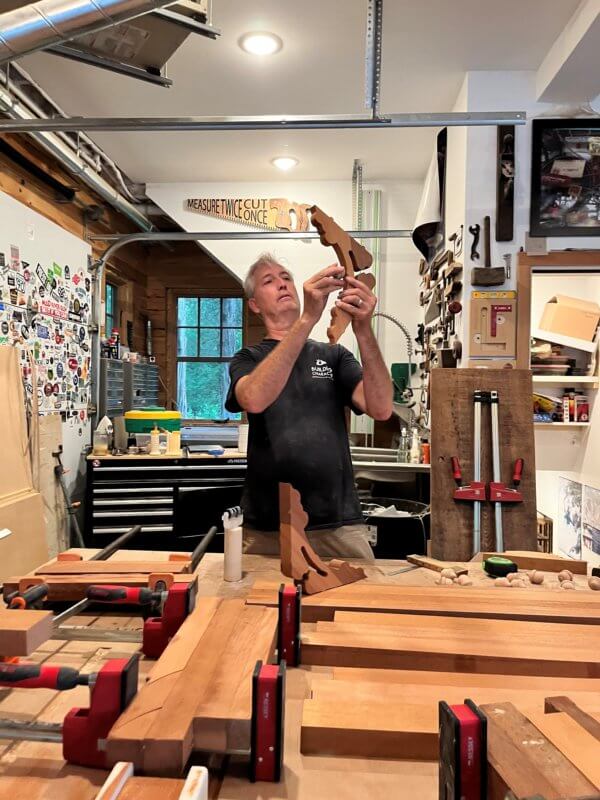Measuring the day in fulfillment rather than seconds
Some of Rich Aherns’ earliest memories are of watching his maternal grandfather in his wood shop.
“I associate woodworking with some of the happiest times of my life,” he said.
That happiness continues through Aherns’ business, Building Character Vermont, which he opened in 2016.
Aherns’ grandfather was a lumber salesman, so woodworking was just a hobby.
“He was more of a tinkerer,” Aherns said. “He liked to fix things, so I learned some basic skills, but later I realized that there was much more than that. The great thing about woodworking is that it’s a lifetime learning experience.”
Although Aherns continued to work with wood, his life had a few twists and turns first. Born and raised in Baltimore, he majored in fine arts and then got his master’s degree in theology.

“I’ve done a lot of church work,” he said, “but that’s really a past life.”
Needing a practical career, Aherns spent almost three decades as a commodities trader.
“I did some house building and renovations in my spare time to keep my sanity,” he said. “I disliked my day job immensely, but I did it as long as I could stand because I had a family.”
After building a house for himself and his wife in Charlotte, Aherns decided to pursue woodworking as a profession.
“I started my business to see what would evolve and come my way,” he said. “I’m not a big fan of production work and doing the same thing all the time. With my business I get to do something different every day of the week.”
Aherns does no advertising, with the exception of the occasional social media post, but he has been incredibly busy since he opened his doors.
“I would work seven days a week if my wife allowed it,” he said.
The business runs the gamut from traditional New England carved signs and dimensional signs to kitchen and bathroom cabinets and custom work for mudrooms and wine cellars.
“I do a lot of mud rooms because most are pretty ill-conceived and don’t meet the needs of a family,” Aherns said. “People don’t really know why they don’t like their mud rooms, but it’s because they’re a cluttered mess. I try to tailor it to the individual family rather than build something generic.”
For the last five years Aherns has been a member of the Charlotte Recreation Commission and he is proud that his colleagues have been tackling larger projects.
“We’re not just a commission that maintains things,” he said. “We are envisioning and executing things for the future for a changing community. That’s what I find most enjoyable. We’re far more dynamic than when I joined; we’re not static.”
In addition to his work in people’s homes, Aherns does some furniture commissions, although those are less frequent.
“I’m busier than I’d like to be,” he said. “I’m trying to wrangle things back to have time for myself.”
Aherns’ son has been working with him for the last several years, but he’ll be moving shortly, so Aherns will return to being a solo operation.
“I love my shop,” he said. “It’s my sanctuary and where I long to be all the time.”
One of Aherns’ favorite parts of on-site work is when a client wants to maintain the history of their home but hasn’t been able to reproduce an existing element.
“I’m currently making some intricate brackets from a stash of old-growth mahogany I had been saving,” he said. “I’m adding acorns to their adornment at the owner’s request. That kind of work makes my brain engage more than doing the usual. The freedom to unleash my artistry is always something that brings me joy.”
While he may have learned traditional methods from his grandfather, Aherns takes advantage of modern technology, including robotic equipment that can cut with a high level of precision.
“I probably have one of the best equipped shops in the region,” he said, “and I do things for other shops. The opportunity to do something that other people can’t figure out is something I relish. I really enjoy unique challenges.”
“When I was in seminary,” Ahrens said, “I learned the difference between an occupation and a vocation. It was when I left the occupational world of commodities and started making wood shavings each day that I truly realized my long-held suspicions of my calling to fine woodworking. Time stands still and I go deeply into my zone. I find an entire day has passed but I measure it in fulfillment rather than seconds.”

